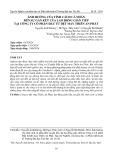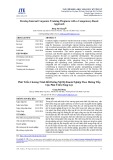
TNU Journal of Science and Technology
229(03): 219 - 226
http://jst.tnu.edu.vn 219 Email: jst@tnu.edu.vn
THE IMPACT OF PERSONALITY TRAITS ON WORK OUTCOMES OF
OFFICERS AT ADMINISTRATIVE UNITS OF
THE HANOI PEOPLE’S COMMITTEE
Nguyen Danh Nam1*, Uong Thi Ngoc Lan2
1East Asia University of Technology
2Independent Researcher
ARTICLE INFO
ABSTRACT
Received:
22/01/2024
The study aims to analyse the impact of personality traits on work
outcomes of officers at the Administrative units of the Hanoi People’s
Committee. A questionnaire survey was conducted to collect data from
455 officers. Collected data were analysed by using structural equation
model to evaluate the impact of personality traits on work outcomes
including job satisfaction, organisational commitment and intention to
stay. The results revealed that a positive relationship between the Big
Five personality traits with organisational commitment, job satisfaction,
and intention to stay. Furthermore, job satisfaction and organisational
commitment are positively correlated with intention to stay in an
organisation of officers. These findings suggested some significant
implications for the Administrative units of the Hanoi People’s
Committee to increase organisational commitment and job satisfaction
and upgrade the intention to stay of officers in the future.
Revised:
22/3/2024
Published:
22/3/2024
KEYWORDS
Personality traits
Organisational commitment
Job satisfaction
Intention to stay
Hanoi
TÁC ĐỘNG CỦA TÍNH CÁCH CÁ NHÂN ĐẾN KẾT QUẢ CÔNG VIỆC
CỦA CÔNG CHỨC TẠI CÁC ĐƠN VỊ HÀNH CHÍNH TRỰC THUỘC
UỶ BAN NHÂN DÂN THÀNH PHỐ HÀ NỘI
Nguyễn Danh Nam1*, Uông Thị Ngọc Lan2
1Trường Đại học Công nghệ Đông Á
2Nhà nghiên cứu độc lập
THÔNG TIN BÀI BÁO
TÓM TẮT
Ngày nhận bài:
22/01/2024
Mục đích của nghiên cứu này nhằm phân tích tác động của tính cách cá
nhân đến kết quả công việc của công chức tại các đơn vị hành chính
trực thuộc Uỷ ban nhân dân thành phố Hà Nội. Một cuộc khảo sát bằng
bảng câu hỏi đã được thực hiện để thu thập dữ liệu từ 455 công chức.
Dữ liệu thu thập được phân tích bằng mô hình cấu trúc tuyến tính để
đánh giá tác động của tính cách cá nhân đến kết quả làm việc gồm sự
hài lòng công việc, sự cam kết tổ chức và ý định ở lại. Các kết quả tiết
lộ có mối quan hệ tích cực giữa 5 yếu tố tính cách cá nhân và sự cam
kết tổ chức, sự hài lòng công việc và ý định ở lại. Hơn nữa, sự hài lòng
công việc và sự cam kết tổ chức có tương quan tích cực với ý định ở lại
tổ chức của các công chức. Các phát hiện này đã gợi mở một số hàm ý
quản trị cho các đơn vị hành chính trực thuộc Uỷ ban nhân dân thành
phố Hà Nội để nâng cao sự cam kết tổ chức, sự hài lòng công việc và
thúc đẩy ý định ở lại của công chức trong thời gian tới.
Ngày hoàn thiện:
22/3/2024
Ngày đăng:
22/3/2024
TỪ KHÓA
Tính cách cá nhân
Sự cam kết tổ chức
Sự hài lòng công việc
Ý định ở lại
Hà Nội
DOI: https://doi.org/10.34238/tnu-jst.9625
* Corresponding author. Email: ndnam.dr.90@gmail.com

TNU Journal of Science and Technology
229(03): 219 - 226
http://jst.tnu.edu.vn 220 Email: jst@tnu.edu.vn
1. Introduction
Human resources are the backbone of all activities in the organisation, and it directly affects
the existence, development, and competition of the organisation. If an organisation wants to
achieve good performance, it needs good employee performance. Work outcomes refer to a set of
attitudes and behaviors related to implementing organizational goals and can be measured.
Scholars stated that work outcomes were measured by job satisfaction, organisational
commitment, job performance and so on [1]. Personnel psychology focuses on the application of
explanatory and technological theories of human resource management [2]. Two underlying
theories which help to pin the model are personality and reaction action theories. Personality
theories are created by four major theories (psychoanalytic, humanistic, trait and social
cognitive), with trait theory being one of the most popular perspectives of personality theories
[3]. It is proposed that an individual’s thoughts and actions are determined by personality and
traits that have a significant impact on human behavior [4]. This theory stated that personality is
made up of five distinct traits. Complementing the personality theories in this study is the
reaction action theory. The main tenets of this theory are that work outcomes, like the act of
remaining in a job or turnover intention, or in-role and extra-role bahaviors, are directly
determined by behavioral intentions [5].
The studies on organisational behaviour focus on analysing personality traits. They concluded
that personality traits have a direct impact on an employee’s thoughts, behaviour, and social
relationships [6]. Hence, personality traits are an important tool for evaluating work outcomes of
employees. In recent years, there have been many domestic and foreign studies exploring
employees’ individual differences of personality traits. For instance, Nguyen Van Thuy [7]
analysed the impact of big-five dimensions of personality and job performance of bank
employees in Ho Chi Minh City. His findings revealed that extraversion and conscientiousness
have a strong influence on job performance. More recently, Ha Nam Khanh Giao et al. [8]
indicated Big Five personality traits have a direct impact on the hotel staffs’ engagement with
their work. Kang and Malvaso [9] explored the relationships between personality traits and
various areas of job satisfaction. Their results revealed that neuroticism has a negative association
with all aspects of job satisfaction, whereas agreeableness and conscientious have positive
associations with job satisfaction. And extraversion had a weak negative association with
satisfaction. Lately, Hung and Chiu [10] showed personality scales (extraversion, emotional
stability, conscientiousness, agreeableness) were highly correlated with intention to stay among
home care aides in Taiwan, except for the openness trait. However, previous studies only
analysed one of many aspects of work outcomes. In addition, they did not investigate the public
sector. More importantly, there is no empirical investigation study at Administrative units of the
Hanoi People’s Committee. Thus, to fill in the research gap, the article aims to analyse impact on
personality traits on various aspects of work outcomes (organisational commitment, job
satisfaction, intention to stay) of officers at Administrative units of the Hanoi People’s
Committee, and discover the relationships between organisational commitment, job satisfaction
and intention to stay of officers.
2. Methods
Through a review of previous studies, especially based on the research model of Kheng et al.
[11], the authors inherited the Big Five personality traits including openness, conscientiousness,
extroversion, agreeableness and emotional stability. The research hypotheses and model are
proposed as shown in Figure 1.
Preliminary scale is built based on the factors in the study framework and inherited from
domestic and foreign studies, in which, the scale of the Big Five personality traits model coming
into of Kheng et al. [11] includes twenty observed variables. The scale of organisational

TNU Journal of Science and Technology
229(03): 219 - 226
http://jst.tnu.edu.vn 221 Email: jst@tnu.edu.vn
commitment includes six observed variables of Meyer et al. [12]. The scale of job satisfaction
inherited of Tran Kim Dung [13] includes five observed variables. The scale of intention to stay
includes four observed variables of Hung and Chiu [10].
Figure 1. Research Model
To be relevant to the field of study, the authors discussed with fourteen department-level
managers with long-term experience working at the Administrative units of the Hanoi People’s
Committee to carefully review the content related to factors, add or remove inappropriate
observed variables. In addition, in-depth interviews were conducted with five experts on human
resource management to understand the relationships among factors, adjust the study framework
and solve problems arising during the discussion. Due to the COVID-19 pandemic, the authors
conducted group discussions and in-depth interviews using Microsoft Team.
The quantitative research results showed that discussion managers and experts agreed with
factors in the proposed study framework. For the Big Five personality traits model, 3/5 experts
and 10/14 discussion managers thought that it is necessary to need to add one observed variable
to each personality trait so that the content of each personality shows more clearly and meet the
requirements of research in the public sector. For the intention to stay in an organisation, experts
and discussion managers said that the item of the observed variables in the original scale is not
suitable for examination in the public sector, and they need to change. Based on the above
comments, the authors synthesised and built four observed variables of intention to stay in an
organisation. For the organisational commitment and job satisfaction, experts and discussion
managers agreed with the question in the original scale. In addition, the authors adjusted words to
be consistent for the public sector and the education level of survey participants.
Hair et al. [14] stated that the minimum sample size to use exploratory factor analysis (EFA)
is 50 samples, preferably 100 or more. The ratio of items on an analytic variable of 5:1 or 10:1
will provide the minimum sample size of the study to ensure reliability. This study has 40 items,
so the sample size is 400. Besides, to avoid the low probability of a vote recovery, the authors
took the sample size of 490 samples.
The study used a convenient sampling method for officers working at the Administrative units
of the Hanoi People’s Committee. The survey period was from May 1st to July 31st, 2021. The
survey forms were sent directly by email to officers.
The study investigated 7 Administrative units of the Hanoi People’s Committee (including
Hanoi Tax Department, Ha Noi Customs Department, Hanoi Statistics Department, Hanoi
Market Surveillance Department, Hanoi Social Security Office, Hanoi State Treasury, and The
State Bank in Hanoi Branch). According to statistics from the Hanoi People’s Committee [15],

TNU Journal of Science and Technology
229(03): 219 - 226
http://jst.tnu.edu.vn 222 Email: jst@tnu.edu.vn
each administrative unit had more than 100 officers. Therefore, the authors divided the survey
questionnaires equally among the research sites as 70 samples per unit to ensure an objective and
fair assessment among them at the Administrative units of the Hanoi People’s Committee. After
cleaning the data, the study collected 455 valid answer sheets with a return rate of 92.86%. Male
respondents constituted 67.2% of the sample. 91.4% of respondents were middle-aged (more than
35 years old), 92.5% of respondents with the education level were mainly university and post-
graduate, and 91.6% of respondents got married.
3. Findings and Discussion
The results showed that the latent variable “Extroversion” has the lowest Cronbach’s Alpha
value of 0.778, while the latent variable “Conscientiousness” has the highest of 0.852. Compared
with standard 0.6, all observed items of the scale are internally consistent. The corrected item-
total correlation coefficient is higher than 0.3 [14]. All scales achieve two reliability and
discriminant validity. Hence, the scale is good and meets the reliable requirement for exploratory
factor analysis.
The study used the Principal Axis Factoring extraction method along with Promax rotation.
The Exploratory Factor Analysis (EFA) was conducted with 40 observed items from eight factors
including the Big Five personality traits, job satisfaction, organisational commitment, and
intention to stay. The EFA obtained results with the coefficient KMO = 0.812; Bartlett Test is
statistically significant with Sig. = 0.000 (< 0.05), and eight factors were extracted with
Eigenvalue = 1.422; Sums of Squared Loadings = 80.121% (higher than 50%). And the eight
factors can explain about 80.121% of the variance of all the variables from the total variance
explained [14]. Table 1 summarised the results of Cronbach’s alpha and EFA of the overall scale.
Table 1. Survey items and reliability for measures in the study
Abbr.
Cronbach’s Alpha
Factor loadings
Abbr.
Cronbach’s Alpha
Factor loadings
Openness (O)
Emotional stability (ES)
O1
0.823
0.899
ES1
0.811
0.878
O2
0.895
ES2
0.869
O3
0.890
ES3
0.865
O4
0.883
ES4
0.860
ES5
0.858
Conscientiousness (C)
Organisational commitment (OC)
C1
0.852
0.897
OC1
0.799
0.868
C2
0.894
OC2
0.864
C3
0.893
OC3
0.855
C4
0.888
OC4
0.852
C5
0.880
OC5
0.850
OC6
0.844
Extroversion (E)
Job satisfaction (JS)
E1
0.778
0.889
JS1
0.808
0.866
E2
0.885
JS2
0.859
E3
0.879
JS3
0.853
E4
0.975
JS4
0.848
E5
0.870
JS5
0.840
Agreeableness (A)
Intention to stay (ITS)
A1
0.803
0.882
ITS1
0.840
0.863
A2
0.877
ITS2
0.851
A3
0.874
ITS3
0.843
A4
0.870
ITS4
0.838
A5
0.869
(Source: Results of data processing by the authors)

TNU Journal of Science and Technology
229(03): 219 - 226
http://jst.tnu.edu.vn 223 Email: jst@tnu.edu.vn
The results of Confirmatory Factor Analysis (CFA) in Figure 2 indicated that the model has
1432 degrees of freedom, the test value CMIN = 432.674 with the probability value = 0.000; the
CMIN/df index = 2.532 is lower than 3.0 and the goodness-of-fit index (GFI) = 0.906, the
Tucker-Lewis index (TLI) = 0.910, the comparative fit index (CFI) = 0.915 are higher than 0.9,
the root-mean-square error of approximation (RMSEA) = 0.030 is lower than 0.08 [16]. So, the
research model is consistent with the research data.
Figure 2. The results of the confirmatory factor analysis of the overall model scale
(Source: Results of data processing by the authors)
The results of CFA of the overall model scale show that the weights of the items are all standard
(≥ 0.5). Hence, the scales reach the convergent validity [17]. In addition, there is no correlation
between the measurement errors, so the items achieve unidimensionality. The correlation coefficient
of each research concept is significantly different from 1, so the components reach discriminant
values. The analysis results also show that the scales meet the requirements of reliability.
Furthermore, the authors test the scale’s reliability. The reliability test results indicated that
the composite reliability and the total variance extracted value are higher than 0.5. Besides, the
overall reliability has a value of greater than 0.6. Hence, the analytical results showed that all the
research model concepts meet the requirement of high reliability. Therefore, the scale is suitable
for the analysis of the structural equation modeling [18].
Based on the outcomes of the confirmatory factor analysis of the overall model scale, the
results of the structural equation modeling are consistent with the research data with the values of
CMIN/df = 2.567 < 3, GFI = 0.904, TLI = 0.907, CFI = 0.912 are higher than 0.9 and RMSEA =
0.035 is lower than 0.08 [16].
At the same time, based on the analysis results, the probability value of the impact
relationships among the factors is lower than 0.05. Hence, the relationship among Big Five
personality traits, job satisfaction, organisational commitment and intention to stay is statistically
significant in the structural equation modeling (SEM). Table 2 summarised the model results.
The results in Table 2 pointed out that the Big Five personality traits have a positive impact on
organisational commitment, job satisfaction, and intention to stay in an organisation.
Conscientiousness has the strongest impact on organisational commitment, job satisfaction, and
intention to stay with 95% confidence and the standardised estimate of 0.354, 0.362, 0.371.
Emotional stability has a weakest impact on organisational commitment, job satisfaction, and
intention to stay in an organisation with a standardised estimate of 0.205, 0.121, and 0.212. The


























